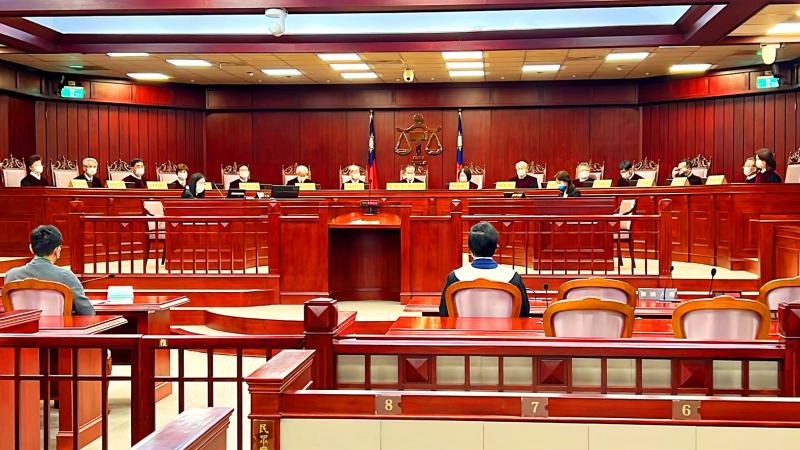A legal provision that grants indigenous status to people with only one indigenous parent based strictly on their name has been declared unconstitutional by the Constitutional Court.
The court took aim at Article 4, Paragraph 2 of the Status Act for Indigenous Peoples (原住民身分法), which states: “Children of intermarriages between indigenous peoples and non-indigenous peoples taking the surname of the indigenous father or mother, or using the indigenous peoples traditional name shall acquire indigenous peoples status.”
The court said in a statement on Friday that it struck down the clause because it contravened the Constitution’s “intention” to protect indigenous peoples’ right to personal identities and guarantee racial equality.

Photo: Chang Wen-chuan, Taipei Times
It ordered the government to amend the law within two years, saying that if the deadline was not met, people in such situations could automatically identify as indigenous and register their status.
An estimated 95,000 people in Taiwan would be eligible to declare their indigenous status under such circumstances.
The Constitutional Court took up the issue because of a case involving a seven-year-old girl surnamed Wu (吳) whose mother is Truku and whose father is not indigenous.
When the father tried to register his daughter’s indigenous status at the Nangang Household Registration Office, the request was rejected because she used her father’s Chinese surname, which did not comply with the act. The family then lost an administrative appeal against the decision.
The court said that the clause contravened Article 7 of the Constitution, which stipulates that all people are equal under the law, regardless of gender.
As children in Taiwan generally take their father’s surname, the clause in question means that children who have an indigenous father can get indigenous status while those with an indigenous mother cannot, the court said.
In terms of identity, the court said the provision’s attempt to tie indigenous identity to a parent’s surname was flawed, as the concept or tradition of a “surname” does not exist in indigenous culture.
The Council of Indigenous Peoples had said the law was constitutional because it gave people the right to choose their identity.
However, it said it respected the court’s decision and would consult with indigenous groups before proposing legal provisions that would meet their needs and fulfill the court’s requirements.

NATIONAL SECURITY THREAT: An official said that Guan Guan’s comments had gone beyond the threshold of free speech, as she advocated for the destruction of the ROC China-born media influencer Guan Guan’s (關關) residency permit has been revoked for repeatedly posting pro-China content that threatens national security, the National Immigration Agency said yesterday. Guan Guan has said many controversial things in her videos posted to Douyin (抖音), including “the red flag will soon be painted all over Taiwan” and “Taiwan is an inseparable part of China,” while expressing hope for expedited “reunification.” The agency received multiple reports alleging that Guan Guan had advocated for armed reunification last year. After investigating, the agency last month issued a notice requiring her to appear and account for her actions. Guan Guan appeared as required,

A strong cold air mass is expected to arrive tonight, bringing a change in weather and a drop in temperature, the Central Weather Administration (CWA) said. The coldest time would be early on Thursday morning, with temperatures in some areas dipping as low as 8°C, it said. Daytime highs yesterday were 22°C to 24°C in northern and eastern Taiwan, and about 25°C to 28°C in the central and southern regions, it said. However, nighttime lows would dip to about 15°C to 16°C in central and northern Taiwan as well as the northeast, and 17°C to 19°C elsewhere, it said. Tropical Storm Nokaen, currently

PAPERS, PLEASE: The gang exploited the high value of the passports, selling them at inflated prices to Chinese buyers, who would treat them as ‘invisibility cloaks’ The Yilan District Court has handed four members of a syndicate prison terms ranging from one year and two months to two years and two months for their involvement in a scheme to purchase Taiwanese passports and resell them abroad at a massive markup. A Chinese human smuggling syndicate purchased Taiwanese passports through local criminal networks, exploiting the passports’ visa-free travel privileges to turn a profit of more than 20 times the original price, the court said. Such criminal organizations enable people to impersonate Taiwanese when entering and exiting Taiwan and other countries, undermining social order and the credibility of the nation’s

‘NATO-PLUS’: ‘Our strategic partners in the Indo-Pacific are facing increasing aggression by the Chinese Communist Party,’ US Representative Rob Wittman said The US House of Representatives on Monday released its version of the Consolidated Appropriations Act, which includes US$1.15 billion to support security cooperation with Taiwan. The omnibus act, covering US$1.2 trillion of spending, allocates US$1 billion for the Taiwan Security Cooperation Initiative, as well as US$150 million for the replacement of defense articles and reimbursement of defense services provided to Taiwan. The fund allocations were based on the US National Defense Authorization Act for fiscal 2026 that was passed by the US Congress last month and authorized up to US$1 billion to the US Defense Security Cooperation Agency in support of the